Dạng đề Describe a place là một trong các dạng bài chính của bài thi IELTS Speaking. Hôm nay hãy cùng The Catalyst for English giúp bạn “gỡ rối” đề “Describe a place you visited on vacation” trong IELTS Speaking Part 2 và Part 3 nhé!
I. Từ vựng liên quan đến “Describe a place you visited on vacation”
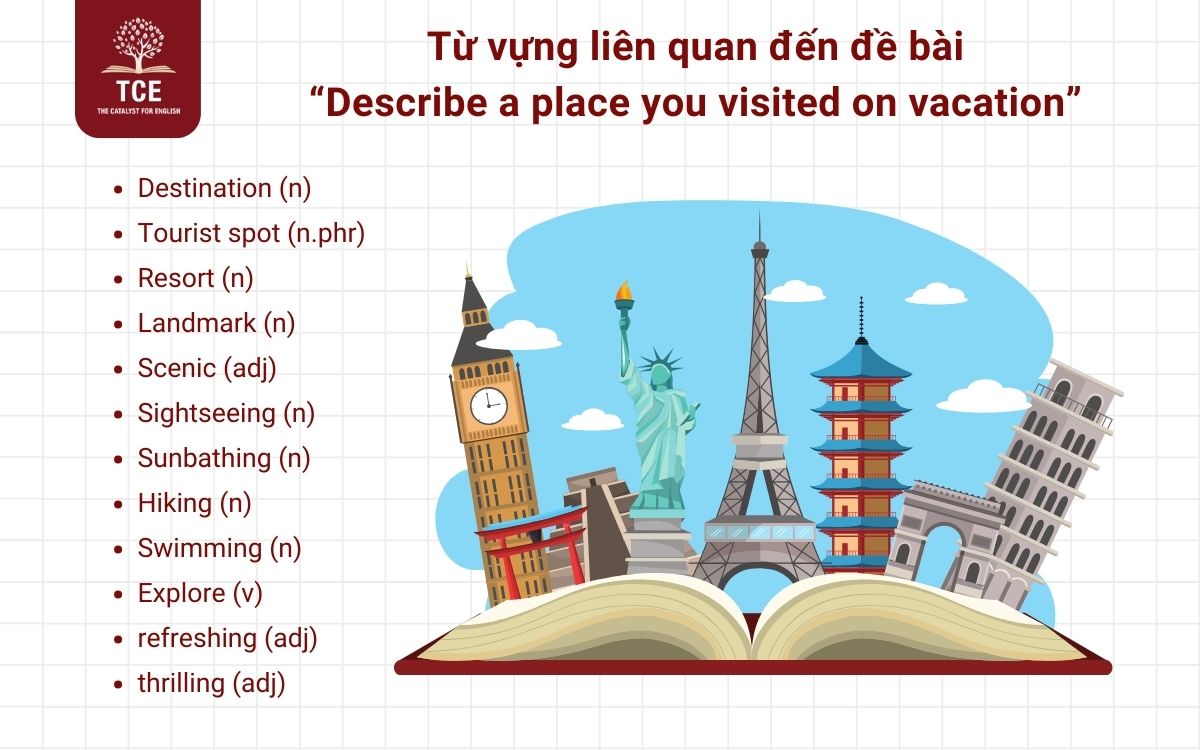
Từ vựng liên quan đến “Describe a place you visited on vacation”
Để làm tốt bài thi IELTS Speaking, một trong những yếu tố không thể thiếu đó là từ vựng liên quan chủ đề này. TCE sẽ trang bị cho các học viên chùm từ vựng liên quan chủ đề Describe a place you visited on vacation ngay sau đây:
| Từ vựng |
Ý nghĩa |
Ví dụ |
| 1. Location (từ vựng chỉ địa điểm) |
| Destination (n) |
điểm đến |
The Caribbean is a popular holiday destination.
(Caribbean là một điểm đến nghỉ dưỡng phổ biến.) |
| Tourist spot (n.phr) |
địa điểm du lịch |
This is an important tourist spot, where many people go to watch the sunrise.
(Đây là một điểm du lịch quan trọng, nơi nhiều người đến để ngắm bình minh.) |
| Resort (n) |
khu nghỉ dưỡng |
Rimini is a thriving holiday resort on the east coast of Italy.
(Rimini là một khu nghỉ mát phát triển sôi động ở bờ biển phía đông của Ý.) |
| Landmark (n) |
danh lam thắng cảnh |
The Rock of Gibraltar is one of Europe’s most famous landmarks.
(Đá Gibraltar là một trong những biểu tượng nổi tiếng nhất của châu Âu.) |
| Scenic (adj) |
phong cảnh đẹp |
They took the scenic route on the way home.
(Họ đã đi theo con đường có phong cảnh đẹp trên đường về nhà.) |
| 2. Activities (từ vựng chỉ các hoạt động) |
| Sightseeing (n) |
tham quan |
We did some sightseeing in Paris.
(Chúng tôi đã tham quan một số địa điểm ở Paris.) |
| Sunbathing (n) |
tắm nắng |
Unlike other parts of Cuba, topless sunbathing is allowed here.
(Khác với những nơi khác ở Cuba, việc tắm nắng không áo là được phép ở đây.) |
| Hiking (n) |
leo núi |
We’re going hiking in the Sierra Nevada.
(Chúng tôi sẽ đi leo núi ở Sierra Nevada.) |
| Swimming (n) |
bơi lội |
We spent the day on the beach but it was too cold to go swimming.
(Chúng tôi đã dành cả ngày ở bãi biển nhưng trời quá lạnh để đi bơi.) |
| Explore (v) |
khám phá |
The best way to explore the countryside is on foot.
(Cách tốt nhất để khám phá vùng nông thôn là đi bộ.) |
| 3. Nature (Từ vựng chỉ thiên nhiên) |
| beach (n) |
bãi biển |
We spent the day on the beach.
(Chúng tôi đã dành cả ngày trên bãi biển.) |
| waterfall (n) |
thác nước |
Can you feel the spray from the waterfall?
(Chúng tôi đã dành cả ngày trên bãi biển.) |
| mountain (n) |
núi |
The Matterhorn is one of the biggest mountains in Europe.
(Matterhorn là một trong những ngọn núi lớn nhất ở châu Âu.) |
| 4. Từ vựng chỉ cảm giác, trải nghiệm |
| relaxing (adj) |
thư giãn |
I find swimming so relaxing.
(Tôi thấy bơi lội thật thư giãn.) |
| exciting (adj) |
thú vị |
You’re going to Africa? How exciting!
(Bạn sắp đi châu Phi à? Thật thú vị! ) |
| unforgettable (adj) |
không thể quên |
It was the most harrowing and unforgettable experience of my life.
(Đó là trải nghiệm đau thương và không thể quên nhất trong đời tôi.) |
| refreshing (adj) |
làm tươi mới |
There’s nothing more refreshing on a hot day than a cold beer.
(Không có gì sảng khoái hơn vào một ngày nóng nực bằng một chai bia lạnh.) |
| thrilling (adj) |
hồi hộp, li kì |
The book is a thrilling adventure story.
(Cuốn sách là một câu chuyện phiêu lưu hồi hộp.) |
II. Bài mẫu Describe a place you visited on vacation IELTS SPEAKING Part 2
Giờ thì hãy cùng TCE bắt tay vào giải quyết đề bài Describe a place you visited on vacation nhé:
1. Đề bài
Describe a place you visited on vacation
You should say:
– Where it is
– When and with whom you went there
– What activities you did there
– How you feel about that place
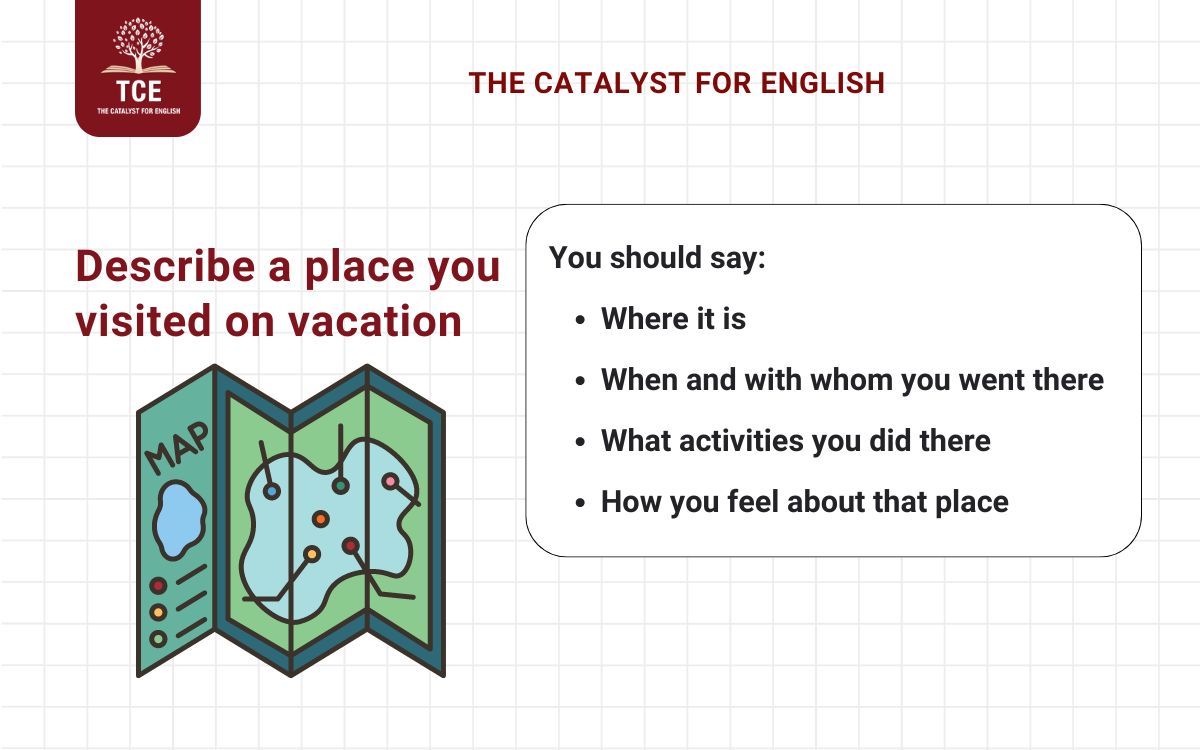
Đề bài
2. Dàn ý
Việc lên dàn ý sẽ giúp người nói phát triển ý tưởng một cách rõ ràng và đầy đủ khi nói. Hãy cùng TCE tham khảo dàn ý dưới đây nhé:
| 1. Introduction |
– Short description (Mô tả ngắn về nơi đã đến): Name of City/Country (tên địa điểm), Famous for? (nổi tiếng vì cái gì)
– Reasons you choose (Lý do tại sao chọn nơi này để đi du lịch.) |
| 2. Description of the Place |
– Location (địa điểm): Where is it located? (địa điểm đó nằm ở đâu)
– Weather (thời tiết)
- How was the weather? (Thời tiết thế nào?)
- Did it affect your activities? (Thời tiết ảnh hưởng thế nào đến các hoạt động của bạn?)
– How You Got There (Cách thức bạn đến đó)
- Mode of transportation (car, train, plane, etc.) (Phương tiện)
- Duration of the trip (thời gian)
- Who you traveled with (Người đi cùng là ai)
– First Impressions (Ấn tượng đầu tiên)
- What did you notice first? (Bạn chú ý cái gì đầu tiên?)
- How did you feel when you arrived? (Cảm xúc)
- What was unique about the place? (Điều gì đặc biệt mà bạn ấn tượng)
|
| 3. Activities (Các hoạt động) |
– What did you do? (sightseeing, hiking, shopping, etc.) (Bạn đã làm gì)
– Cultural experiences (museums, festivals) (Các trải nghiệm văn hóa)
– Food and Drink (Ẩm thực)
- What kind of food did you try? (Bạn đã thử món gì?)
– People (Con người)
- How were the locals? (Mô tả người dân địa phương)
– Highlights (Những điểm nổi bật của chuyến đi)
- Best moments of the trip (những điều tuyệt nhất)
- Anything unexpected? (Có điều gì bất ngờ?)
|
| 4. Conclusion, Overall Feelings (Kết bài, cảm xúc chung) |
– Your feelings (cảm xúc)
– Your plan, Would you visit again? (dự định tương lai)
– How did the trip impact you? (ý nghĩa chuyến đi với bạn) |
3. Bài mẫu
Giờ thì hãy cùng TCE xem bài mẫu cho đề bài Describe a place you visited on vacation nhé:
During my last vacation, I had the opportunity to visit Da Lat, a charming city located in the Central Highlands of Vietnam. Known for its cool climate, scenic landscapes, and unique French colonial architecture, Da Lat has become a popular destination for both local and international tourists.
The city is often referred to as the “City of Eternal Spring” because of its mild weather year-round. The first thing that struck me when I arrived was the abundance of flower gardens and pine forests, which gave the city a tranquil and romantic atmosphere. There’s something magical about walking through the colorful gardens, where the vibrant flowers seem to be in full bloom no matter the season.
One of the highlights of my trip was visiting Xuan Huong Lake, which is a peaceful spot in the heart of the city. I rented a bicycle and took a leisurely ride around the lake, enjoying the fresh air and beautiful scenery. Another unforgettable experience was exploring the Crazy House, a surreal architectural marvel that felt like stepping into a fantasy world. The house’s quirky design and imaginative structure were truly unlike anything I had seen before.
In addition to sightseeing, I also had the chance to enjoy Da Lat’s famous cuisine. The grilled rice paper and avocado ice cream were particularly memorable, giving me a taste of the city’s unique flavors.
All in all, my visit to Da Lat was a refreshing escape from the hustle and bustle of everyday life. The combination of its cool climate, stunning landscapes, and rich culture made it an ideal vacation spot. If I have a chance, I hope I can return someday to experience even more of what this beautiful city has to offer.
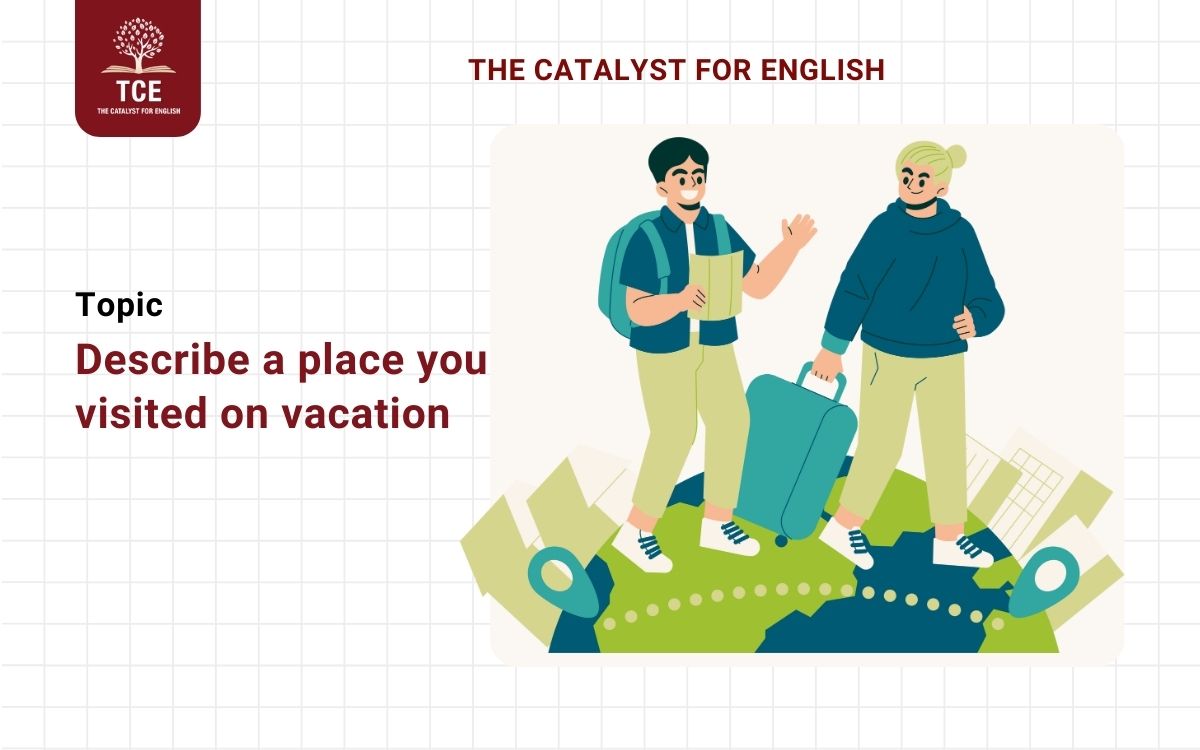
Bài mẫu về Describe a place you visited on vacation
>>> Tham khảo thêm:
4. Phân tích từ vựng và cấu trúc
Sau khi đã đọc bài mẫu phía trên, hãy cùng TCE phân tích các từ vựng và cấu trúc tốt đã được sử dụng trong bài mẫu Describe a place you visited on vacation nhé:
| Từ vựng |
Ý nghĩa |
Ví dụ |
| charming (adj) |
hấp dẫn, thu hút |
We had dinner with our director and his charming wife.
(Chúng tôi đã ăn tối với giám đốc và người vợ duyên dáng của ông ấy.) |
| scenic (adj) |
phong cảnh đẹp |
It’s an area of outstanding scenic beauty.
(Đây là một khu vực có cảnh đẹp nổi bật.) |
| eternal (adj) |
vĩnh cửu |
The company is engaged in the eternal search for a product that will lead the market.
(Công ty đang tham gia vào cuộc tìm kiếm vĩnh viễn một sản phẩm sẽ dẫn đầu thị trường.) |
| year-round (adv) |
quanh năm |
Joshua Tree National Park is open year-round.
(Công viên Quốc gia Joshua Tree mở cửa quanh năm.) |
| abundance (n) |
sự dồi dào |
The area has an abundance of lakes, rivers, and streams to fish in.
(Khu vực này có nhiều hồ, sông và suối để câu cá.) |
| tranquil (adj) |
yên bình |
The hotel is in a tranquil rural setting.
(Khách sạn nằm trong một khung cảnh nông thôn yên tĩnh.) |
| surreal (adj) |
vô thực |
Driving through the total darkness was a slightly surreal experience.
(Lái xe trong bóng tối hoàn toàn là một trải nghiệm hơi siêu thực.) |
| refreshing (adj) |
mới mẻ |
There’s nothing more refreshing on a hot day than a cold beer.
(Không có gì sảng khoái hơn vào một ngày nóng bức bằng một chai bia lạnh.) |
| 1 |
If I have a chance, I hope I can return someday to experience even more of what this beautiful city has to offer. |
|
Cấu trúc: If + S + V s/es, S + will/can/shall + V
|
| Phân tích: Câu điều kiện loại 1 diễn tả sự việc, hành động có thể xảy ra ở hiện tại hoặc tương lai, |
| 2 |
One of the highlights of my trip was visiting Xuan Huong Lake, which is a peaceful spot in the heart of the city. |
| Cấu trúc: clause, which…. |
| Phân tích: Mệnh đề quan hệ which giúp bổ sung thông tin về vật trong câu. |
III. Describe a place you visited on vacation – IELTS Speaking Part 3
Dưới đây là một số câu hỏi Part 3 liên quan đến chủ đề Describe a place you visited on vacation mà đội ngũ giảng viên của TCE đã biên soạn, các bạn cùng theo dõi nhé:
1. Why do people like to travel to different places?
Answer: People enjoy traveling to different places for various reasons. Firstly, traveling offers a break from the routine, which can be refreshing and rejuvenating. Secondly, it allows individuals to explore new cultures, try different cuisines, and experience different lifestyles. Lastly, travel often provides opportunities for personal growth and learning, as people discover new perspectives and ways of thinking.
Vocabulary:
- Refreshing (adj) & rejuvenating (adj): sảng khoái, đem lại cảm giác tươi mới
- Explore (v): khám phá
- Personal growth (n.phr): sự phát triển của cá nhân
2. What kind of places do people usually prefer for vacations?
Answer: Most people tend to prefer relaxing destinations such as beaches, resorts, or mountain retreats. These places offer peace and tranquility, away from the hustle and bustle of city life. However, some people enjoy visiting cultural hotspots, like historical cities or famous landmarks, to immerse themselves in art, architecture, and history.
Vocabulary:
- Peace and tranquility (n): sự yên bình
- Hustle and bustle (n): sự ồn ào, náo nhiệt, xô bồ
- Immerse (v): chìm đắm
3. How do you think tourism affects the local environment and culture?
Answer: Tourism can have both positive and negative impacts on the local environment and culture. On the positive side, it boosts the local economy and promotes cultural exchange. On the negative side, over-tourism can lead to environmental degradation, such as pollution and damage to natural landscapes. Additionally, it can sometimes dilute or commercialize local cultures, as traditions are altered to cater to tourists.
Vocabulary:
- Over-tourism (n): quá tải du lịch
- Environmental degradation (n.phr): suy thoái môi trường
- Dilute (v): hòa tan
4. Do you think people will travel more in the future?
Answer: Yes, I believe people will travel more in the future, especially as travel becomes more affordable and accessible. The advancement in transportation technologies, such as high-speed trains and budget airlines, will likely contribute to this trend. Additionally, the rise of digital nomads, who work remotely while traveling, may also increase the frequency of travel.
Vocabulary:
- affordable (adj): giá cả phải chăng
- accessible (adj): dễ tiếp cận
- advancement (n): sự cải tiến
- digital nomads (n.phr): những người thường xuyên làm việc từ xa khi đi du lịch
5. What are the disadvantages of visiting famous tourist destinations?
Answer: One major disadvantage of visiting famous tourist destinations is overcrowding, which can make the experience less enjoyable. Another issue is the higher cost of services, such as accommodation and food, in popular tourist spots. Additionally, famous destinations often lose their authenticity as they become overly commercialized, catering more to tourists than to locals.
Vocabulary:
- overcrowding (adj): đông đúc
- authenticity (n): tính xác thực
- commercialized (adj): thương mại hóa
Để giúp bạn đạt được band điểm IELTS mong muốn, ngoài việc tham khảo các bài mẫu IELTS Speaking, bạn cũng có thể trải nghiệm khóa luyện thi IELTS tại TCE. Với đội ngũ giảng viên chất lượng cao, chương trình học biên soạn đặc biệt và lớp bổ trợ 1-1, TCE sẽ đồng hành cùng bạn trong suốt hành trình luyện thi, cam kết giúp bạn đạt kết quả tốt nhất.
Nếu bạn muốn tự tin hơn về kỹ năng của mình, đừng quên tham gia thi thử IELTS trên máy tính tại TCE. Được tổ chức online và offline, các buổi thi thử sẽ giúp bạn đánh giá chi tiết khả năng Writing và Speaking, từ đó cải thiện những điểm yếu và chuẩn bị sẵn sàng cho kỳ thi chính thức. Kết quả thi được nhận ngay lập tức cùng với sự đánh giá từ giám khảo có chuyên môn sâu, giúp bạn xác định rõ chiến lược luyện thi phù hợp.
Trên đây là bài mẫu Speaking Part 2 và một số câu hỏi follow-ups Part 3 cho đề “Describe a place you visited on vacation”. Hi vọng với những cấu trúc và từ vựng được giới thiệu phía trên,dạng đề describe a place không còn “khó xơi” đối với chúng mình nữa nhé. Đừng quên áp dụng ngày hôm nay nhé!
>>> Tham khảo thêm:




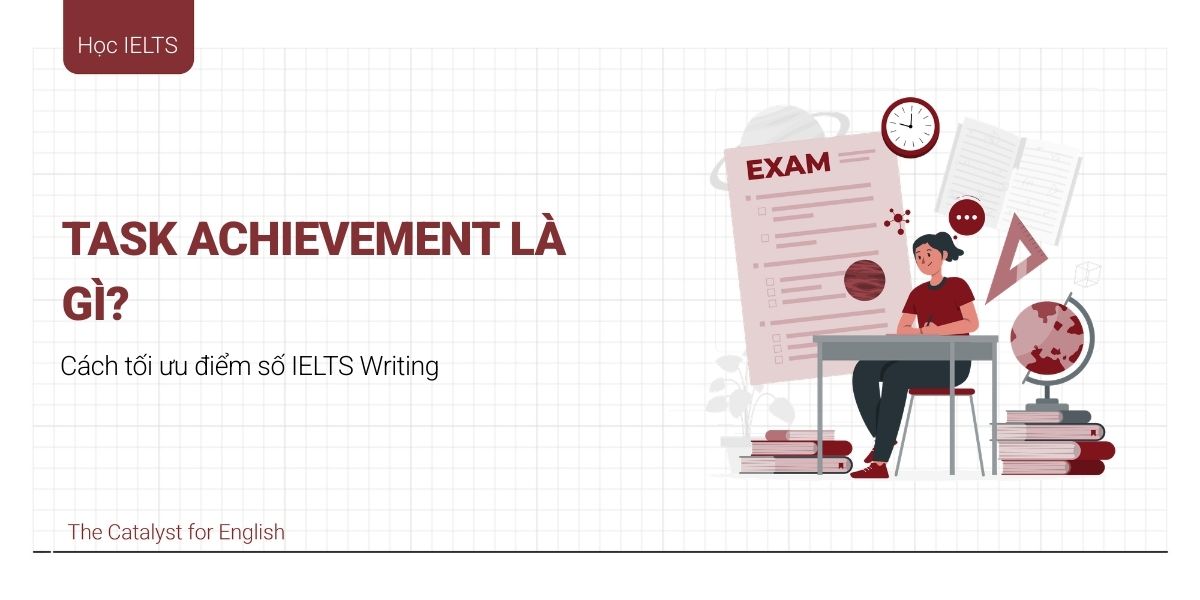

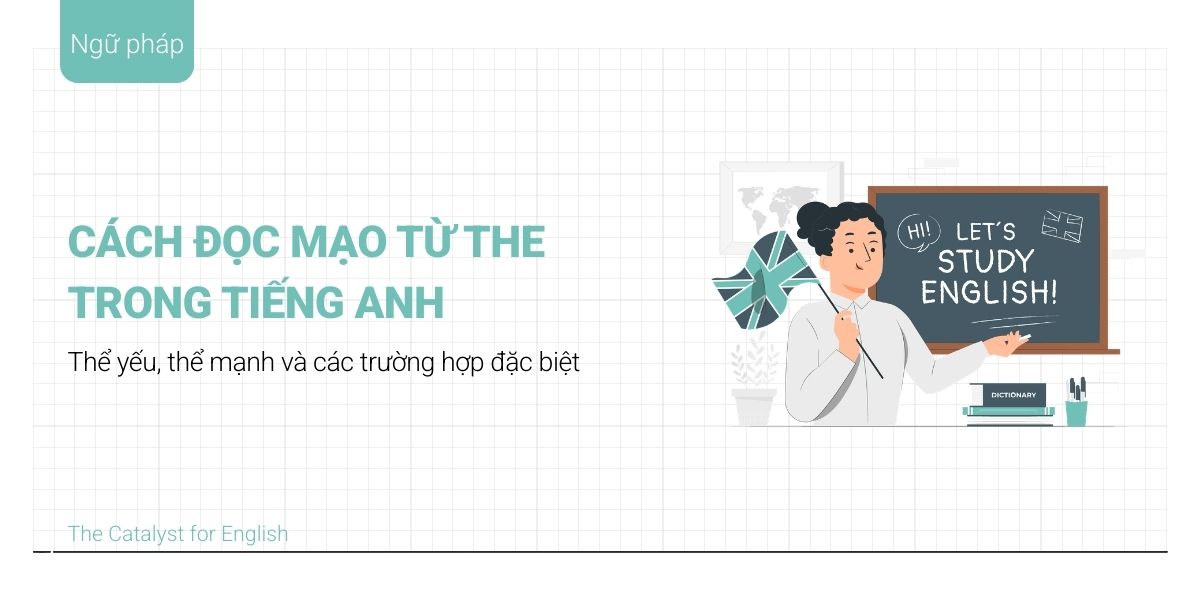

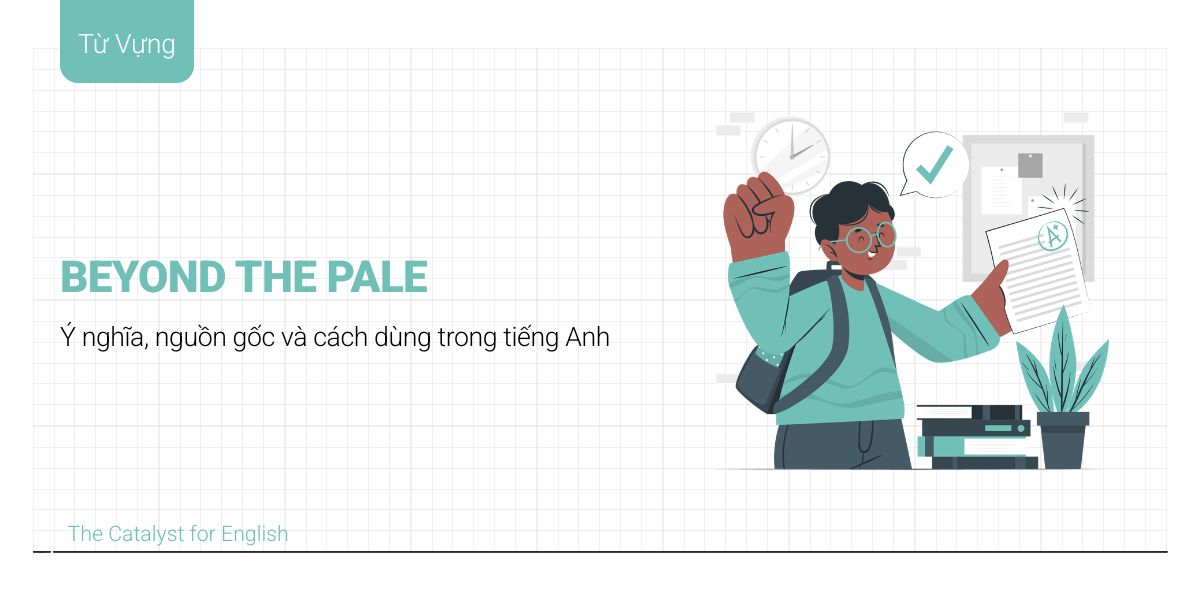
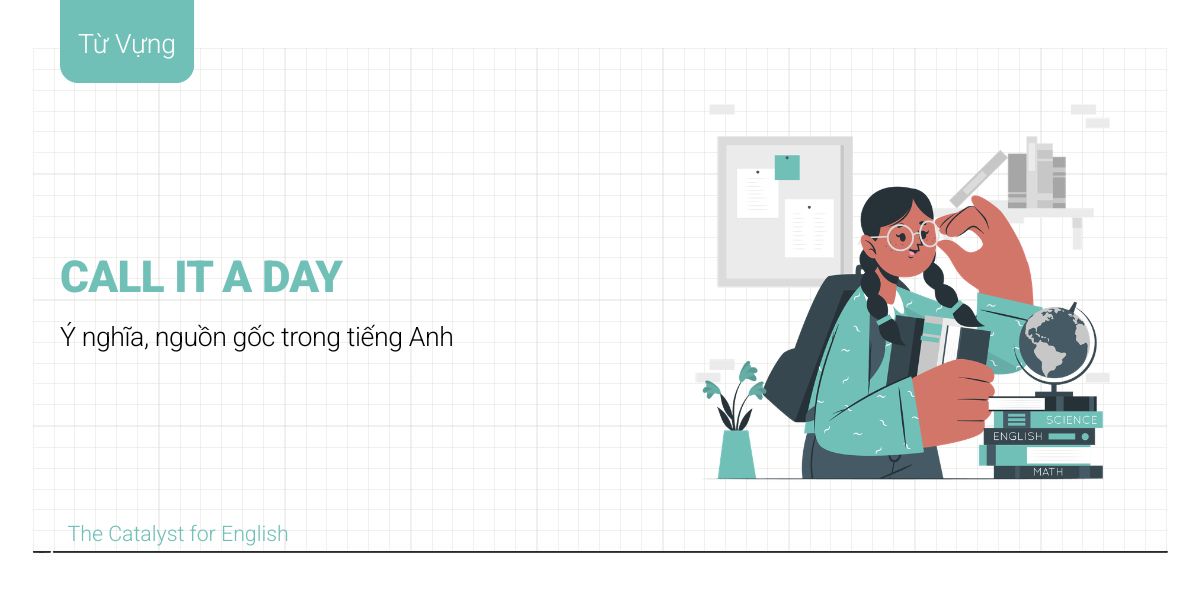
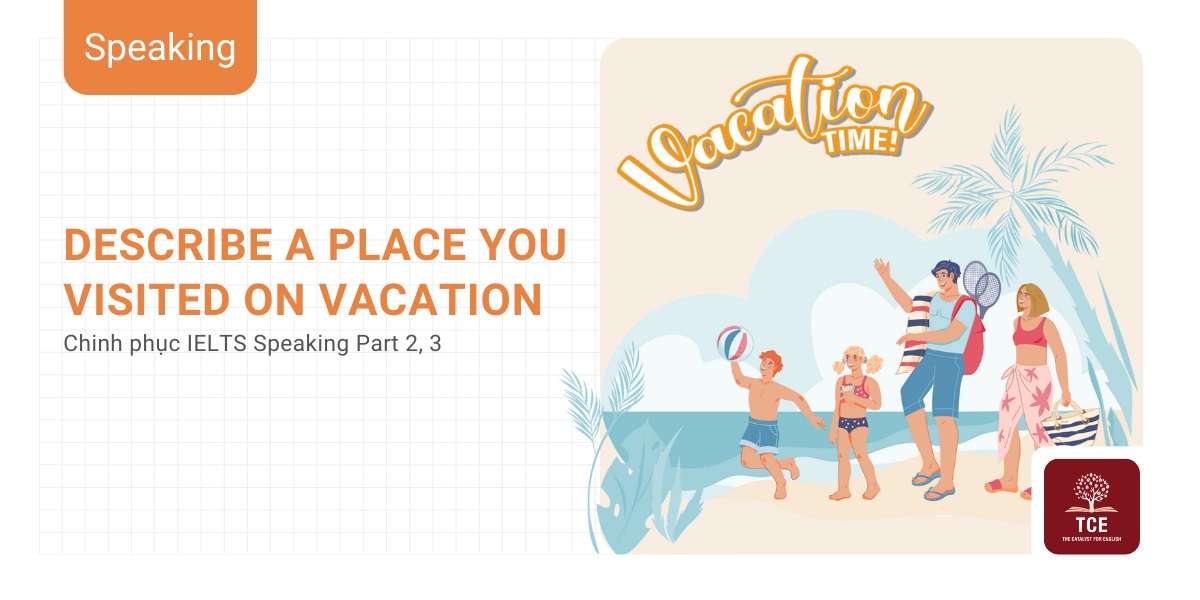



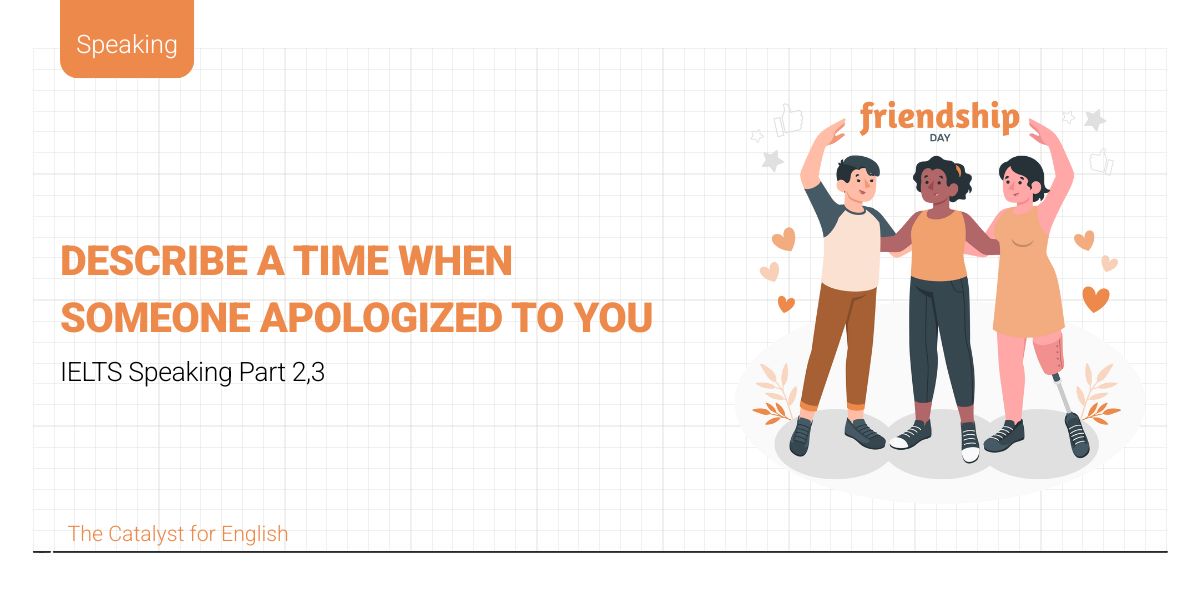
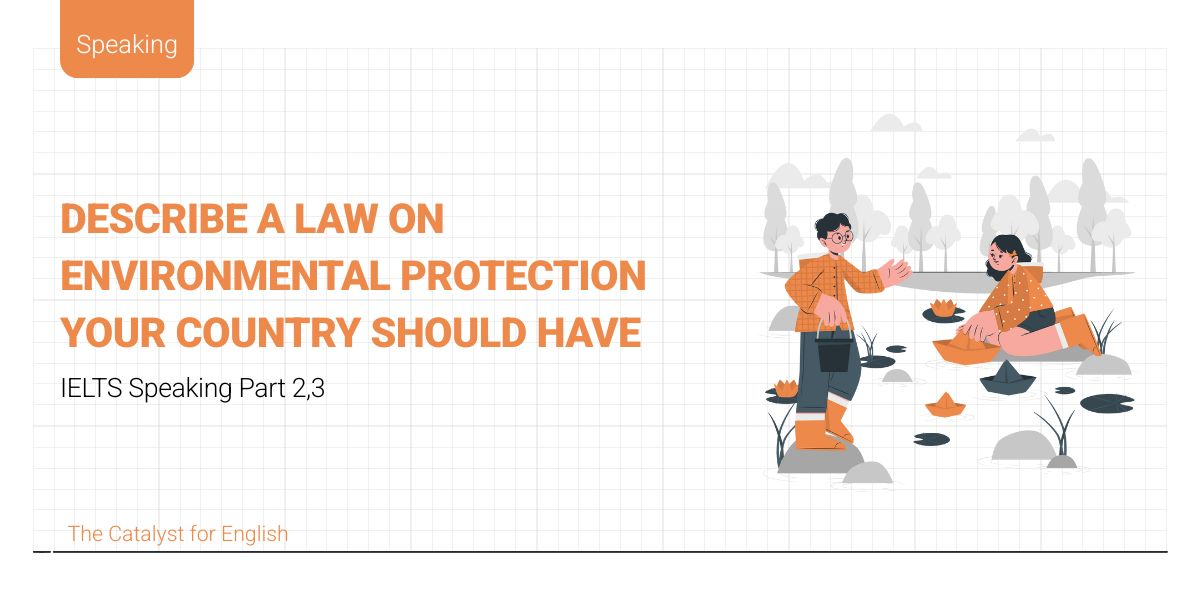
![[ IELTS Speaking Part 2] Describe an electronic device you use often](https://thecatalyst.edu.vn/blogs/wp-content/uploads/2026/02/describe-an-electronic-device-you-use-often.jpg)